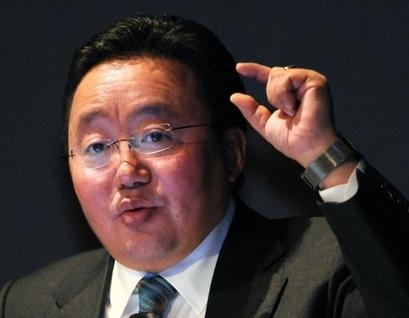Mongolia: Mongolia says to promote renewable energy development
2013/01/01

Mongolian President Tsakhia Elbegdorj said Monday that his country had rich renewable energy resources and would vigorously pursue development in this area.
Solar, wind and other renewable energy resources were very rich in Mongolia, Elbegdorj said at the opening of the Northeast Asia Renewable Energy Resources Cooperation Forum.
The resources were additional than enough to meet domestic request, so the country may export such products in the next, he added.
It was of great significance for Mongolia to do research on and develop renewable energy, he said, while inviting other nations to jointly develop solar and wind energy with Mongolia.
The Mongolian government planned to increase the share of renewable energy to between 20 % and 25 % of its total energy consumption by 2020.
The-day energy forum gathers delegates from China, South Korea, the Democratic People's Republic of Korea, Japan, Russia, France, Britain, the Asian Development Bank and the International Energy Agency.
- Related Articles
-
Inauguration of Mongolia's president-elect scheduled for July 10
2017/07/10 Mongolia's president-elect Khaltmaa Battulga will be inaugurated on July 10, authorities said Sunday. Miyegombyn Enkhbold, Mongolia's parliament speaker, has issued an order to hold an extraordinary parliament conference to prepare for the inauguration ceremony of the newly elected president on Monday morning. -
Mongolia’s mighty military diplomacy
2017/07/10 Mongolia is quickly becoming known for its world military presence. With China and Russia as its only direct neighbours, Mongolia faces a conundrum. Mongolia’s foreign policy is dominated by the necessity to balance the influences of its powerful neighbours and the need to gather support from like-minded nations. Mongolia refers to this as their ‘Third Neighbour Policy’, which aims to allow for economic and political self-determination independent of both China and Russia. Mongolia’s military is key to the execution of this policy. -
Saving face on the Korean Peninsula
2017/05/07 Kim Jong-un sees nuclear capability as almost his sole source of regime security and he is not going to give it up, no matter how strong the pressure. He is not stupid. All he has to do is to look at the history of Iraq and Libya, where neither dictator had nuclear weapons. So if the United States insists on de-nuclearisation of the peninsula, presumably that would require regime change, and regime change is unlikely without the use of force. War in the area would be hugely destabilising and potentially disastrous. No one in their right mind should want that. China is right to urge negotiations, but what is to be negotiated? Kim is not going to negotiate away his own security by giving up his nuclear capability. But if China exerts sufficient pressure, he may acknowledge to stop testing. -
Higher earning Why a university degree is worth more in some countries than others
2016/12/11 A university education may expand your mind. It will as well fatten your wallet. Data from the OECD, a club of rich nations, show that graduates can expect far better lifetime earnings than those without a degree. The size of this premium varies. It is greatest in Ireland, which has a high GDP per chief and rising inequality. Since 2000 the unemployment rate for under-35s has swelled to 8% for those with degrees – but to additional than 20% for those without, and nearly 40% for secondary school drop-outs. The country’s wealth presently goes disproportionately to workers with letters next their names. -
Asian Markets Retreat After Oil Prices Fall Again
2016/01/26 Asian stock markets retreated on Tuesday, snapping a two-day winning streak, following the weak cues overnight from Wall Street and the pullback in oil prices. Investors as well treaded cautiously ahead of monetary policy statements by the U.S. Federal Reserve and the Bank of Japan later in the week. The Japanese market is notably lower, with the negative lead from Wall Street and the fall in oil prices denting risk appetite. Additionally, a stronger yen hurt exporters' stocks. In late-morning trades, the benchmark Nikkei 225 Index is declining 319.08 points or 1.86 % to 16,791.83, off a low of 16,683.64 in early trades.
-
- Mongolia News
-
- MONGOLIA: Battulga will receive the seal from outgoing President Tsakhiagiin Elbegdorj.
- MONGOLIA: Mongolia’s mighty military diplomacy
- CHINA: Saving face on the Korean Peninsula
- AFGHANISTAN: Higher earning Why a university degree is worth more in some countries than others
- CHINA: Asian Markets Retreat After Oil Prices Fall Again
- AFGHANISTAN: Global growth will be disappointing in 2016: IMF's Lagarde
- Trending Articles
-
- QATAR: Qatar Airways transit business in jeopardy
- EGYPT: Egypt foreign reserves at highest since 2011 uprising
- QATAR: Qatar plans to boost gas production by 30%
- EGYPT: Egypt announces new sharp increase in fuel prices
- SAUDI ARABIA: Saudi stock market bullish on new heir
- MOROCCO: Morocco delays currency reform amid speculation









